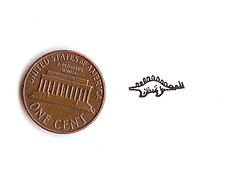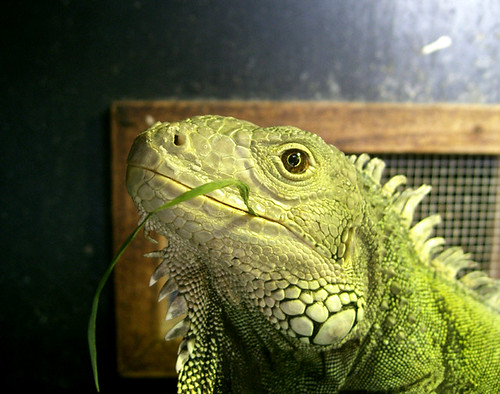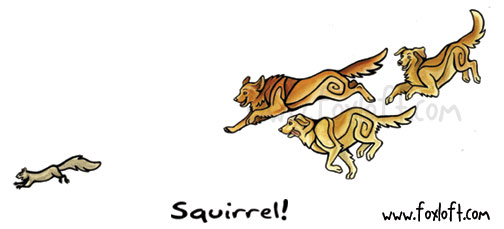I think I've shown that I'm a fan of Nathan Winograd. I've purchased his book, I've drunk his coolaid. I am, you could say,
on board, with his no-kill message.
But whoo boy am I pissed about his recent
blog post.
He argues that there's no such thing as an "invasive species". Or rather, that it's unfair to use that label because... I dunno, ecosystems change over time or something. Trying to follow his logic makes my head hurt. I also realize I must not have read this section of his book very carefully the first time around because I thought he was speaking only about feral cats. Apparently he was much more broad in scope.
Specifically, he quotes "The Bugman" a
San Francisco Chronicle columnist. He's anwering a letter about Light Brown Apple Moth in California. He apparently thinks that it's mean to discriminate against the poor moth just because it's a pest that attacks many types of food crops.
Because of my job, I've done quite a bit of research into the Light Brown Apple Moth "situation" that happened in California. I think I could be considered an expert in this area.
The end of the Bugman's quote is most telling: "...When we start using pesticides to control the “invasive” species, we are going to affect everything living in that ecosystem, including our own species. We found that out when they started spraying those chemicals to control the light brown apple moth. Many people complained of adverse health effects."
What happened was that "some" (see, I can use qualitative statements too) hysterical, rich people were pissed that someone dared to apply a pesticide near their homes (it's OK when it's applied near other people's homes) and made claims of (mostly mild) health effects. Now, the state didn't handle the situation very well, (in fact, minus a sex scandal or something, it's hard to imagine how they could have handled it worse). It was a PR nightmare. But I am highly skeptical of the "adverse health effects" reported after the application.
The product used was a moth pheromone, one of the many natural chemicals floating around in the air that we breathe every day. Practically non-toxic for people. It's certainly less toxic than most of the pesticides allowed in organic agriculture. The amount of chemical that the "victims" would have been exposed to would have been less than what they get from stuffing their yuppie faces with organic veggie burgers every day. Or, yanno, from breathing city air. Or swallowing pool water from the gym, or... OK, you get the picture.
Bugman is also very cute in the way he words that paragraph. When we
start using pesticides? Humans have been using chemicals to control pests for thousands of years.
Pests, a word that I bet Winograd and Bugman don't like either, is a creature that we discriminate against because it
competes with us for food. It's not arbitrary. It has nothing to do with freakin' Nazi Germany (I cannot believe he invoked Godwin's Law).
I must just be cranky because I'm clearly one of those "hyperbolic, hysterical “invasion biology” crowd". I used to work for the botany department for the Forest Service. I drove around the national forest documenting and controlling invasive plant species (through non-chemical means. We barely had the budget for one intern, let alone chemicals).
My boss was a botanist. A smart, gentle woman who loved plants and cared deeply about the ecosystems she was a steward of. I'll admit it bothers me a lot to read Wingrad denigrating the work she did because ... it was futile? Because she had no right to discriminate between plants? That she had no right to try to save unique species and ecosystems that would be over run by species that humans introduced? I'm using question marks here because I really don't think he's thought this through very far. To say in the same breath that pesticides are bad, but allowing human-introduced invasive species to kill other species is illogical. Hyperbolic, even.
A diversity of species is important for robust ecosystems. If we do nothing to stop invasives, than we'll end up with a monoculture landscape made up of few species (except in the Southern US, where it will be a single, solid wall of
kudzu). Sure, in a few million years many new species will have evolved to fill the gaps left by the human-caused mass extinction. (Natural selection is likely at work as we speak; I've personally witnessed a deer eating English ivy. I hope she passed on her genes). But just like with global warming, the idea is to slow the destruction we humans are causing
now. Also preserving human quality of life in the process.
Global warming deniers use the same arguments, in fact. The earth has gone through events like this before, why worry or do anything about it now? There's nothing we can do about it anyway, let the invasives spread and take over all they want, the environment will adapt eventually. Let them cut down the entire amazon rain forest, the environment will adapt eventually. Let us burn fossil fuels all we want, the environment will adapt eventually. Bullshit.
Not all species are equal. I'm going to discriminate against the aphids eating my tomato. I'm also going to kill the fleas on my dog and the weeds in my garden. Why is this so hard to understand?
I can't believe that an animal advocate would throw sand in the face of the same scientists who are fighting to control cain toads in Australia, pigs in Hawaii, mongoose in Jamaica.
Maybe Winograd thinks that if he defends one non-native species (feral cats), he has to defend them all. C'mon, Nathan. A colony of feral cats in an urban park is far different from pigs in Hawaii, or kudzu in the southern U.S, or English ivy in Oregon. Even a hysterical biologist can see that.
It is in fact OK to say that feral cats aren't the scourges of nature that some want to make them out to be, and still think that it's a good thing to not allow rats to kill all the birds in Hawaii.





